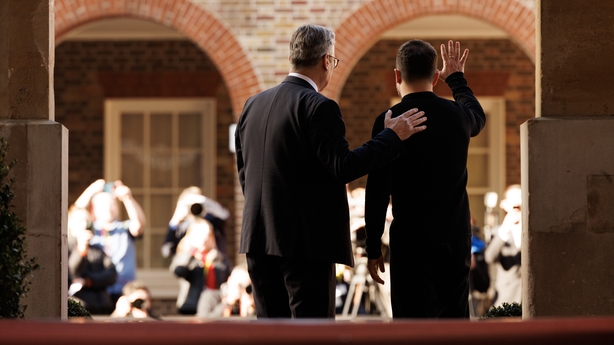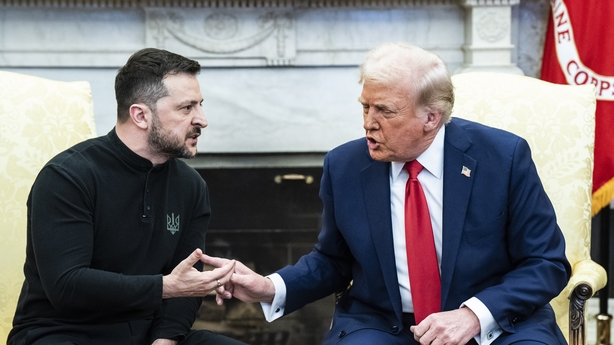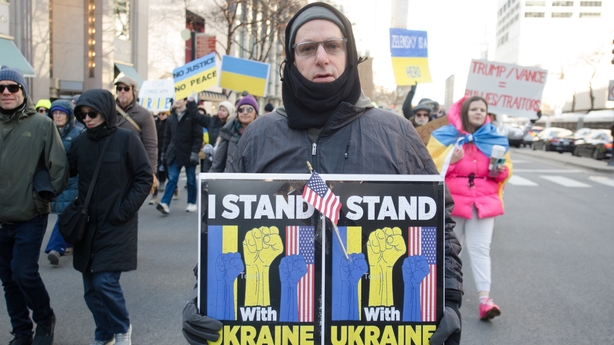US President Donald Trump has said the United States would "not put up with" Ukrainian President Volodymyr Zelensky's rhetoric much longer, as Mr Trump prepared to meet his top team after a disastrous Oval Office row with his Ukrainian counterpart.
"This is the worst statement that could have been made by Zelensky, and America will not put up with it for much longer," Mr Trump said on social media, citing a story quoting Ukraine's president saying the end of the war with Russia was far off.
"This guy doesn't want there to be peace as long as he has America's backing."
Mr Trump also took aim at European leaders who met Mr Zelensky for crisis talks in London at the weekend, saying they had "stated flatly that they cannot do the job without the US."
"Probably not a great statement to have been made in terms of a show of strength against Russia. What are they thinking," Mr Trump said on his Truth Social network.
The broadside came after a meeting between Mr Trump, US Vice President JD Vance and Mr Zelensky at the White House on Friday, which descended into an extraordinary on-camera argument.
Mr Trump and Mr Vance raised their voices and accused Mr Zelensky of being disrespectful and ungrateful for US military assistance, as the Ukrainian pushed his demand for US security guarantees as part of any truce.
We need your consent to load this rte-player contentWe use rte-player to manage extra content that can set cookies on your device and collect data about your activity. Please review their details and accept them to load the content.Manage Preferences
Mr Zelensky was then told to leave the White House, with a crucial deal giving Washington preferential access to Ukraine's mineral resources left unsigned.
Mr Trump is now meeting his top advisors to discuss next steps on Ukraine, US National Security Advisor Mike Waltz told reporters.
White House officials did not confirm a report by the news outlet Axios that Mr Trump was considering cutting all military aid to Kyiv following the row.
European leaders, who have offered peacekeepers to guarantee any ceasefire but also want a US "backstop", met in London yesterday in a desperate bid to resolve the row.
US Secretary of State Marco Rubio spoke by telephone Monday with British Foreign Secretary David Lammy to discuss the leaders' meeting in London.
Mr Rubio "confirmed the United States is ready to negotiate to end the Ukraine-Russia conflict and will continue working with the UK towards peace in Ukraine," State Department spokeswoman Tammy Bruce said.

The UK has said there are several possible proposals on the table for a possible Ukraine ceasefire, after France floated a proposal for a month-long initial truce that could pave the way for peace talks.
"There are clearly a number of options on the table," British Prime Minister Keir Starmer's spokesman said.
"I'm just not getting into a running commentary on the options."
European countries, led by Britain and France, are looking at options for a peace proposal including Ukraine after last week's rupture between Mr Trump and Mr Zelensky.
Mr Starmer hosted the summit of European leaders in London and said European leaders had agreed to draw up a Ukraine peace plan to present to the US.
Read More:
'Coalition of the willing' to present US with Ukraine peace plan - Starmer
Zelensky leaves White House early after angry exchange with Trump
What next for Zelensky after disastrous White House row?
In an interview given on his way to the summit, French President Emmanuel Macron raised the possibility of a one-month ceasefire, although so far there has been no public endorsement from other allies.
"Such a truce on air, sea and energy infrastructure would allow us to determine whether Russian President Vladimir Putin is acting in good faith when he commits to a truce," French Foreign Minister Jean-Noel Barrot said of Mr Macron's proposal.
"And that's when real peace negotiations could start."
Mr Zelensky, asked if he was aware of the plan for a month-long truce mentioned by Mr Macron, told reporters in London: "I'm aware of everything."
France, Britain and potentially other European countries have offered to send troops to Ukraine in the event of a ceasefire, but say they would want support in some form from the US, a proposal referred to as a "backstop".
Mr Zelensky says a ceasefire must come with explicit security guarantees from the West to ensure Russia, which invaded Ukraine three years ago and holds about 20% of its territory, does not attack again. Mr Trump has refused to give any such guarantees.
European countries are adjusting to what some leaders describe as the biggest policy reversal since World War Two from Washington, especially after Friday's meeting between Mr Trump and Mr Zelensky.
Friedrich Merz, the conservative due to become Germany's chancellor after winning the largest share of the vote in an election a week ago, suggested Friday's Oval Office argument was a trap set in advance for the Ukrainian leader.
"It was not a spontaneous reaction to interventions by Mr Zelensky, but obviously a manufactured escalation," he said.
"We must now show that we are in a position to act independently in Europe," he said.

Privately, European officials have been fuming at what they saw as a betrayal of Ukraine, which had previously enjoyed staunch support from the United States since Russia's invasion.
One senior official declared in the aftermath of the blow-up: "Donald Trump has to choose if he wants to call himself a leader of the free world, or leader of an extortion gang. The latter is not interesting for Europe."
But Europeans are also still working hard to keep the US on side. Peter Mandelson, Britain's ambassador to the United States, said Ukrainian-US relations needed to be reset, as Mr Trump's initiative to end the war was "the only show in town".
Mr Trump spoke by phone with Mr Putin last month and then announced that negotiations to end the war would begin quickly, but his contact with Moscow blindsided the EU and Mr Zelensky, raising concerns they would have a deal imposed on them.
European leaders agreed they must spend more on defence to show Mr Trump the continent can protect itself. The European Union is due to hold an emergency summit on Thursday.

EU Commission President Ursula von der Leyen said she will inform member states tomorrow about plans to strengthen the European defence industry and the EU's military capabilities.
"We need a massive surge in defence, without any question. We want lasting peace, but lasting peace can only be built on strength, and strength begins with strengthening ourselves."
Russia has openly gloated over Friday's clash between Mr Trump and Mr Zelensky, praising Mr Trump for altering US policy and denouncing Mr Zelensky for challenging Mr Trump's proposals.
"We see that the collective West has partially begun to lose its collectivity, and a fragmentation of the collective West has begun," Kremlin spokesman Dmitry Peskov said.
"There remains a group of countries that rather constitutes the party of war, which declares its readiness to further support Ukraine in terms of supporting the war and ensuring the continuation of hostilities."

